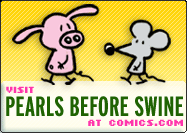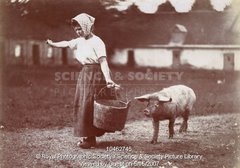Male piglets will no longer have to be castrated in the future to prevent their meat releasing an unpleasant odour when cooking. Researchers at the Animal Sciences Group, together with Norwegian and Chinese colleagues, have now collected enough information on the genetics of boar taint that they believe they will be able to solve the problem by controlled breeding.
‘Castration without anaesthetic no longer necessary in 2010’ is the headline of the press release from the Animal Sciences Group. ‘If everything goes according to plan,’ adds researcher Dr Dick van der Wiel emphatically. ‘We have identified a number of proteins that are involved in the manufacture of boar odour. It means that we can take the relevant genes into account when selecting boars and sows for breeding, so in theory it is possible to breed out the boar taint without losing desirable traits. But we will only have hard evidence in four years’ time,’ he says.
There are few consumers these days who have ever had the misfortune of encountering a piece of pork that has the penetrating ‘boar taint’. Those who have smelt the odour talk of a ‘revolting smell, enough to make you throw up’. Young piglets everywhere in the world are castrated to prevent the pork meat from smelling unpleasant. In the Netherlands castration is carried out without anaesthetic, and therefore damaging for the animals’ welfare, something animal rights activists have been campaigning against for years.
Animal scientists have been working for more than twenty years on alternatives for castration, but have not yet developed a watertight, animal-friendly method. The detection methods used to detect a too high concentration of boar odour in abattoirs are not completely reliable. Immuno-castration, in which a vaccine is used to delay the sexual development of the animals, is technically feasible, but has been shelved due to fear of lack of public acceptance.
Developing a solution through breeding is not new, but previous attempts have always run aground because boar taint is closely related to sex hormone balance, which also influences fertility and growth. In classical breeding programmes, selecting for less boar taint resulted in slower growing and less fertile pigs. Van der Wiel believes that the detailed genetic information the researchers now have will make it possible to breed pigs that are free of boar taint but still have good fertility, meat quality and growth rate.
Norway is particularly interested in being able to breed pigs in this way, as castration will be outlawed in 2009. Dutch veterinarians and pig farmers also indicated last year that they want to stop castrating. The Animal Sciences Group research was co-financed by the Dutch ministry of agriculture. / GvM
"The world is a dangerous place, not because of
those who do evil, but because of those who look on
and do nothing".
- Albert Einstein
those who do evil, but because of those who look on
and do nothing".
- Albert Einstein

Subscribe to:
Post Comments (Atom)








No comments:
Post a Comment